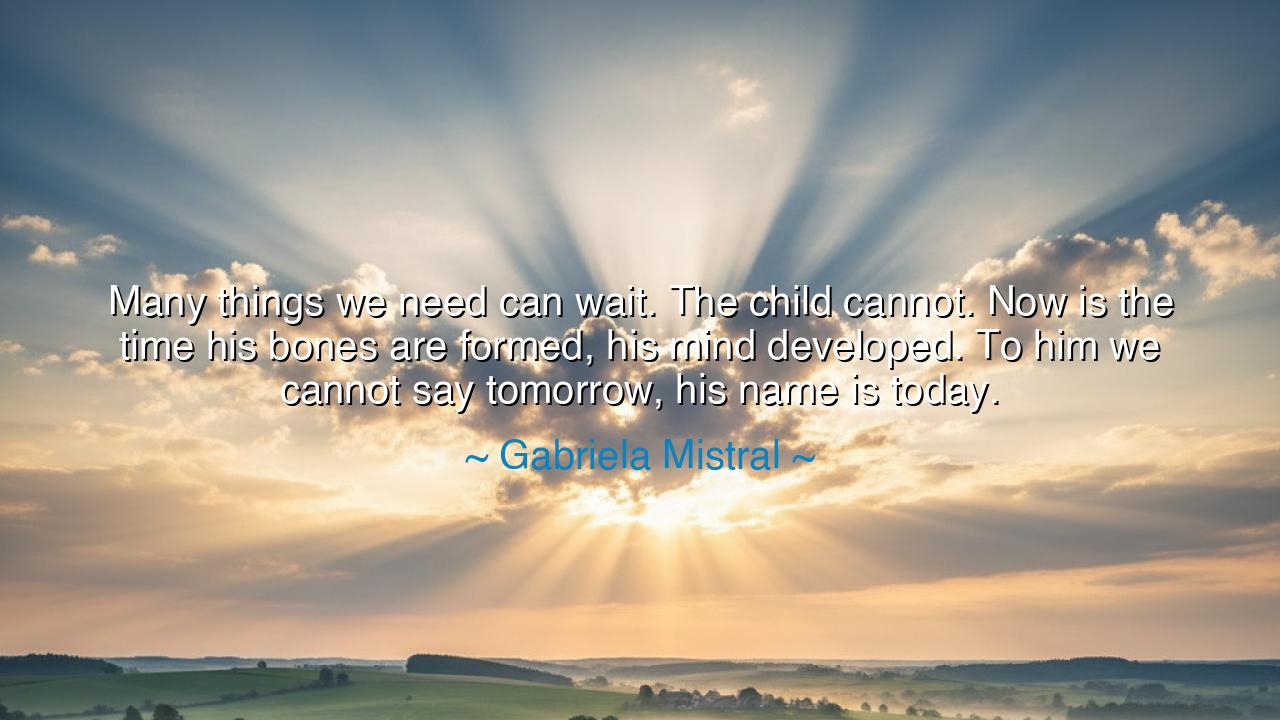
Many things we need can wait. The child cannot. Now is the time
Many things we need can wait. The child cannot. Now is the time his bones are formed, his mind developed. To him we cannot say tomorrow, his name is today.






Gabriela Mistral, the Chilean poet, teacher, and Nobel laureate, gave to the world a timeless truth when she declared: “Many things we need can wait. The child cannot. Now is the time his bones are formed, his mind developed. To him we cannot say tomorrow, his name is today.” These words are more than poetry; they are a sacred call, a reminder that while adults may postpone their labors, their dreams, their ambitions, the growth of a child waits for no one. Childhood is brief, and its shaping cannot be delayed.
The meaning of this saying rests in the urgency of childhood. A child does not grow in some distant future; he grows in the present moment, each day shaping his body, his spirit, and his destiny. While a farmer may wait to sow his field, while a builder may wait to raise his structure, the teacher, the parent, the guardian of the young must act now. For every day neglected, something irreplaceable is lost: a mind left unfed, a heart left uncomforted, a soul left unguided.
Mistral knew this truth intimately, for she was not only a poet but also a teacher of children in rural Chile. She saw with her own eyes how poverty, neglect, and delay robbed children of opportunities to flourish. Her words echo the cry of one who had witnessed too many little ones denied nourishment of body and spirit because their elders thought, “Tomorrow will suffice.” Her reminder that the child’s name is today is a rebuke to complacency and a plea for immediacy.
History affirms her wisdom. Consider the story of Horace Mann, the American education reformer who in the 19th century fought for public schooling. He believed that ignorance was the root of poverty and crime, and that the education of children could not wait for wealth or convenience. His reforms gave rise to schools that lifted generations out of despair. Had he waited, had he said “tomorrow,” countless children would have been lost to labor and poverty. Instead, by acting in the present, he gave them futures they could not have imagined.
The lesson is clear: when it comes to the nurturing of the young—feeding their bodies, educating their minds, and guiding their hearts—there is no tomorrow. We cannot delay kindness, nor postpone attention, nor wait to offer guidance. The child is growing with or without us, and what we give—or withhold—shapes the person he will become. To ignore this urgency is to fail in our sacred duty as guardians of the next generation.
In practice, this means giving priority to the needs of children in our homes, communities, and societies. Listen to them with patience, for their voices are fragile but true. Provide education not as a luxury, but as a right. Offer them food, shelter, and love without delay, for every day matters. When tempted to say, “I will spend time tomorrow,” remember that childhood does not pause—it passes, swift as the dawn.
Therefore, children of tomorrow, hold fast to Mistral’s wisdom: the child’s name is today. Honor the urgency of their growth, for while many things may wait, their needs cannot. Build a world where their bones grow strong, their minds awaken, their spirits are nurtured. And when the elders are gone, these children, shaped by the immediacy of love and care, will carry forth the legacy of a generation that understood the true measure of time. For in truth, to serve the child today is to build the future itself.






AAdministratorAdministrator
Welcome, honored guests. Please leave a comment, we will respond soon